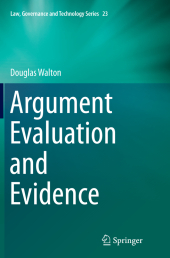 Neuerscheinungen 2016Stand: 2020-02-01 |
Schnellsuche
ISBN/Stichwort/Autor
|
Herderstraße 10
10625 Berlin
Tel.: 030 315 714 16
Fax 030 315 714 14
info@buchspektrum.de |

Douglas Walton
Argument Evaluation and Evidence
Softcover reprint of the original 1st ed. 2016. 2016. xi, 286 S. 71 SW-Abb. 235 mm
Verlag/Jahr: SPRINGER, BERLIN; SPRINGER INTERNATIONAL PUBLISHING 2016
ISBN: 3-319-36755-2 (3319367552)
Neue ISBN: 978-3-319-36755-2 (9783319367552)
Preis und Lieferzeit: Bitte klicken
This monograph poses a series of key problems of evidential reasoning and argumentation. It then offers solutions achieved by applying recently developed computational models of argumentation made available in artificial intelligence. Each problem is posed in such a way that the solution is easily understood. The book progresses from confronting these problems and offering solutions to them, building a useful general method for evaluating arguments along the way. It provides a hands-on survey explaining to the reader how to use current argumentation methods and concepts that are increasingly being implemented in more precise ways for the application of software tools in computational argumentation systems. It shows how the use of these tools and methods requires a new approach to the concepts of knowledge and explanation suitable for diverse settings, such as issues of public safety and health, debate, legal argumentation, forensic evidence, science education, and the use of expert opinion evidence in personal and public deliberations.
Acknowledgments.- Chapter 1: Introduction to Argument and Explanation.- Chapter 2: Inference to the Best Explanation.- Chapter 3: A Dialogue System for Evaluating Explanations.- Chapter 4: Evaluating Expert Opinion Evidence.- Chapter 5: Attribution of a Painting to Leonardo da Vinci.- Chapter 6: Argument from Correlation to Causation.- Chapter 7: Knowledge and Inquiry.- Chapter 8: Evidence and Argument Evaluation.- index.
"The book is an easy-to-follow manuscript, employing simple and clear language suitable for both experts and nonexperts. ... It is a good resource for those practitioners interested in the explanations of knowledge and conflicting evidence occurring in domains such as public safety, health, debate, science education, and legal argumentation." (Luca Longo, Computing Reviews, February, 2016)


